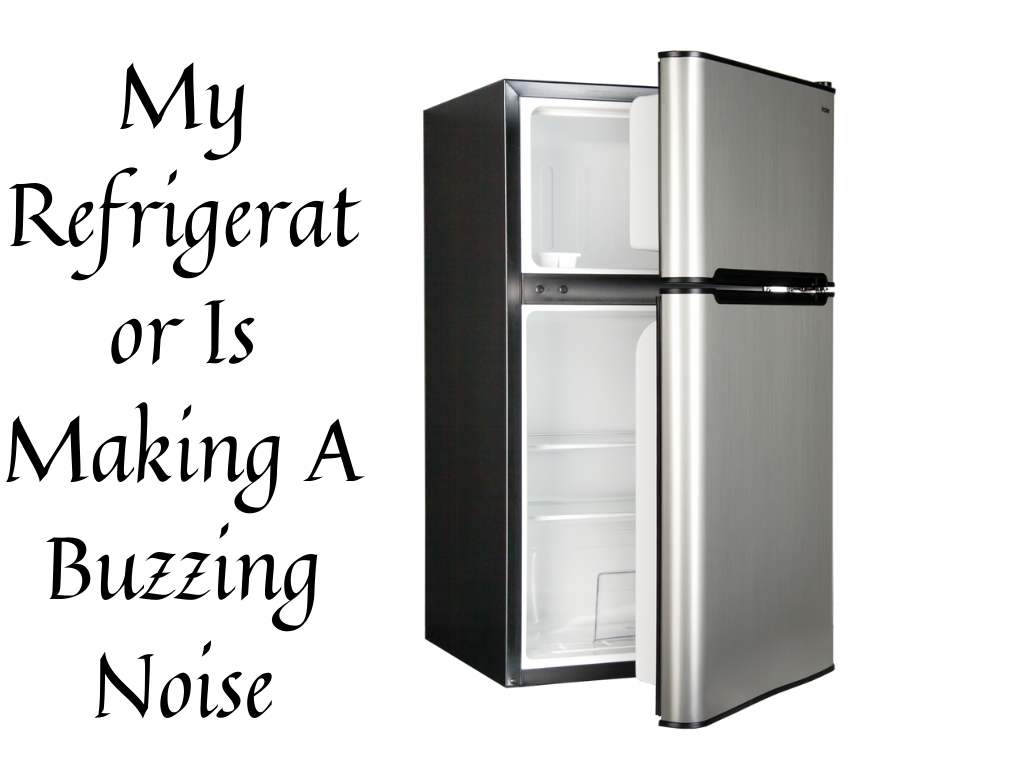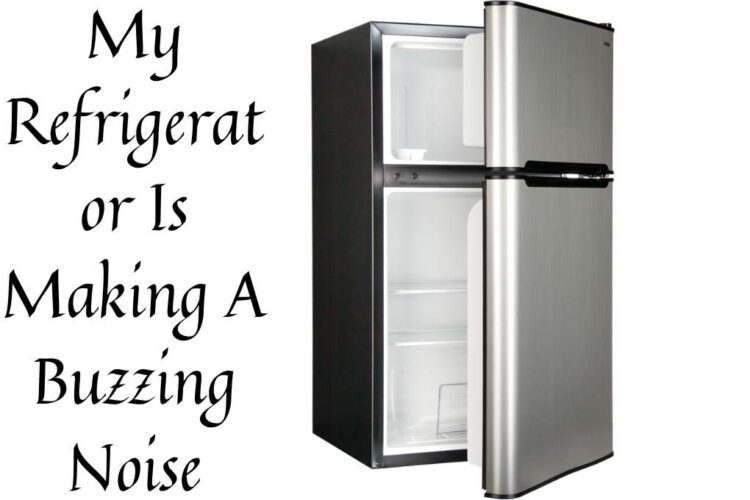My Refrigerator Is Making A Buzzing Noise

Topic: My Refrigerator Is Making A Buzzing Noise
In this article, we will help you understand why your refrigerator may make noise. We will discuss some of the most common parts that can cause noise in your refrigerator, where they are located, and what can go wrong with them.
One of the most common causes of noise with your refrigerator will be the condenser fan motor assembly. It is located behind the refrigerator, close to the floor, and usually behind cardboard or metal access panel. These are some examples of condenser fan motor assemblies, you can have a large metal type motor, small closed plastic style.
My Refrigerator Is Making A Buzzing Noise
The fan blades can be plastic or metal and can have four to six blades. Everything we want to look for is missing a part of the blade of a damaged fan blade or a damaged metal, either bent or deformed.
You’ll also want to check to make sure it’s tight on the motor shaft. Otherwise, you can adjust it and solve your problem. Or the motor shaft itself may be loose in the motor bushings and needs to be replaced as a set.
To inspect the condenser fan motor assembly, we located the motor and blade assembly by removing the rear panel. First, check to make sure there are no obstructions that could be causing that noise. In this case, we have an insulated panel at the bottom that is out of place and is actually hitting the fan blade and it will make a loud noise.
We have a wing that is severely bent and will create vibrating noise when walking. It is very difficult to re-bend them, it is easy to change the blade only. Another common reason for noise in a refrigerator would be an evaporator fan motor. The evaporator fan is located next to the evaporator in the freezer section of the engine, and generally has a metal casing in front.
My Refrigerator Is Making A Buzzing Noise
In a specific refrigerator side by side, the evaporator fan motor will be located on the top and bottom center from the freezer side behind this evaporator cover. First, make sure there is nothing in the ventilation area that can interfere with the blade. Next, we’ll have to remove that cover to inspect the evaporator fan motor and blade assembly.
Check that the blade rotates freely and is not damaged, and that the motor is firmly attached to the bracket and that the shaft is good and that there is no additional play. In a typical top mount refrigerator, the evaporator fan is located far behind the evaporator, access will mean removing the evaporator cover and this will expose the evaporator fan blower motor assembly.
The least common reason for noise in a refrigerator may be related to the compressor. Unlike the noise from the evaporator fan or condenser fan motor, which generally consists of a ticking or scraping sound and is consistent, the compressor noise is more likely to be a knocking sound that probably occurs. time the compressor starts and probably closes again when it happens.
The compressor is usually located near the back and bottom of the refrigerator and will be located behind an access panel. With the access panel removed, you can now see where the compressor is, some of the things we want to check first is that the rubber mounts on the bottom are intact and not damaged.
If it has a sound, it is similar to a clink that occurs once when the compressor starts and again when it ends, it will indicate that you have one inside the compressor with suspension springs. Failure can occur. Replacing the compressor is a fairly expensive repair, and if the noise isn’t too aggressive, you can leave it at that.
You’ll also want to check the tube around the circumference of that compressor, making sure nothing moves there. If you need to move some of those tubes, be careful not to cause twists or sharp turns. Another sound associated with the compressor may be a click when the compressor tries to start.
This is generally caused by the starting device on the side of the compressor, and this is generally not a problem with the compressor itself. Another less common reason for noise in a refrigerator may be related to the water valve. Models that use an ice maker or models that have an ice and water dispenser through the door will have a water valve located on the back of the refrigerator.
If defective, it may cause humming or clicking when activated. If it is periodic, it will probably indicate that it is the water valve part of the ice maker. If you have a dispenser model, you will hear that noise when you press the lever of the water actuator. Now with the back panel removed from the refrigerator, you will see that the valve is located next to the condenser fan motor and the compressor area.
This particular model uses two solenoid valves, one for the water removal side and the other for the ice maker. If you hear a loud buzzing once every three to four hours, it usually indicates that the part of the valve that produces ice is faulty. If you only hear it when you drain the water from the front, it will be the opposite side that feeds the water dispenser.
Most of these valves are a complete unit and if they are defective you will need to replace them as a single unit.
People also ask:
My refrigerator is making a hissing or sizzling noise?
- Such noise will cause oil or refrigerant to flow into the compressor.
- Don’t worry about this, as this is the normal sound of your refrigerator running.
Refrigerator Sizzling noise, gurgling, and running water?
- These sounds are usually heard when the ice melts and the water from the melted ice begins to drip into the drain pan.
- Again, there is no need to worry about these sounds, as they are normal and only part of a normally functioning refrigerator.
Refrigerator Clicking and humming noises?
- This occurs when the valve is opened (or closed) to allow water to enter the ice maker.
- Since this is something a refrigerator does, you can ignore it, but if you don’t need ice, or if it’s not connected to the water line and you probably forgot to turn off the ice maker, then this is what you will need to do.
Refrigerator Clutter noise?
- It is the sound of snowflakes forming and falling in your storage.
- Move, nothing to see here. A normal sound of ice is ready to chill your drink on these hot summer days.
Refrigerator Noise, cracking, and grinding noise?
- These are the sounds of pre-drawn snowflakes being pushed through the mold.
- So just curious snowflakes, nothing to worry about.
Refrigerator Repetitive click noise?
- This is the sound of an evaporation valve to cool the temperature.
- This is a normal sound of your refrigerator getting cold, and you can just get used to it.
Refrigerator Noise from a compressor that has been running for a long time?
- This is what happens in the refrigerator that has highly efficient compressors; They last a long time and very slowly.
- This is normal and means that your compressor works efficiently.
Refrigerator Popping noise?
- This sound is the sound of expansion and contraction of the internal walls of the refrigerator due to changes in temperature.
- This is a normal sound that you don’t need to worry about.
Do the fridges make noise and knocks?
- Chances are you have a few items on top of your refrigerator that may jump a little.
- Check for items on top and remove them. If not, you may consider contacting a repairman.
Refrigerator Pulsing noise and noise?
- This is the sound of compressors and fans inside the refrigerator tuned for overall performance.
- This is a normal sound from your refrigerator working fine.
Refrigerator Vibration noise?
- The refrigerator may not level properly on the floor.
- Adjust the legs of your refrigerator so that it is firmly on the floor with all four legs.




Pingback: How To Fix A Noisy Refrigerator Fan? » Al Azhar Foodie